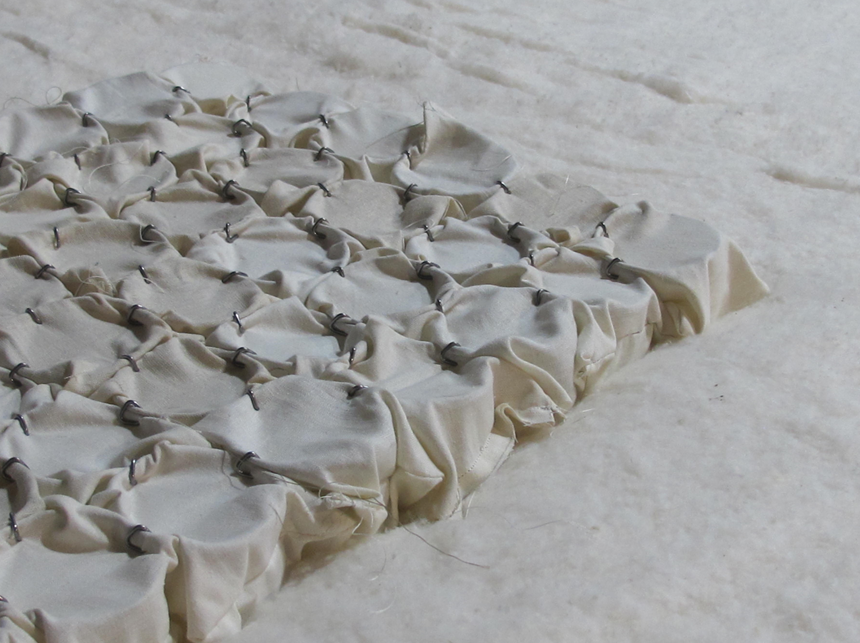A visit to EcoBalanza’s workshop in Seattle
/By Estelle Pin
It’s not a factory—that’s the first thing you need to understand about EcoBalanza. There are no machines, none of those loud repetitive industrial noises, there’s no chemical or metallic smell. When you walk into the space at EcoBalanza, there are five craftsmen and women, working together, laughing and smiling together, and creating beautiful works of art, quietly, by hand.
Some pieces are quite large: a bedframe for a king sized bed, fully upholstered, is one of the recently completed works, waiting for some finishing touches. It takes up a large corner of its own, and when it finally passes all of Aimee’s meticulous inspections, it will go to its new home, for some glamorous person in Europe, who likes their headboards 8 feet tall. The piece I fall for during my visit is also a headboard, more curved and romantic, also upholstered, but drastically different in style, and probably half the size. I imagine this client and I have a lot more in common.
Nearby, layers of wool are being stitched together with one long big needle, to make the cushion of a chaise. The fabric for this one is a rich cherry red. I run my hands over seams of finished pieces, awestruck knowing the hours of labor that go into each stage of construction—more so, when I feel the tension inside each frame. These pieces feel sturdy, solid, but soft, welcoming. I sit down in a completed loveseat that waits by the door for packaging, and Aimee raises an eyebrow at me, giving me a moment to soak it all in before asking for my opinion. My positive review leaves her glowing.
It’s clear that for her, it’s a labor of love. Aimee moves through the workshop with an excited hop in her step that keeps her more airborne than grounded, pulling me towards this piece of wool, or that piece of leather, or this fully finished couch. She has me touch everything, feeling the materials that never see the light of day once sandwiched into layers inside fabric. Her eyes catch every detail, and when I reach for a round of wool, she quickly redirects me to another, of higher quality—the one I originally saw has to be returned, it doesn’t meet her standards.
She explains every step of the process to me, showing various stages of construction, and answers every question I can think to ask. The whole time, she’s also switching back and forth to Spanish, as she watches over her crew, and makes minute adjustments to their work.
I excuse myself to explore a bit, though the space isn’t so huge that exploring takes me very far. There are shelves piled high with materials all the way to the ceiling, some 20 feet above us, and every inch of usable space is being put to work in some way or another. I find a pile of vegetable-treated leather in every color you can imagine. It’s softer than I can describe, like passing your hand through ethereal space, and the green is especially brilliant. I notice some frames for pullout couches, Aimee explains later that those come to her pre-made—metalwork is probably the only thing they don’t do here.
Before I leave, Aimee shows me one last thing. She brings it over cradled in two hands; the foot of a couch. It’s only about 4 inches long, hand tooled on a lathe and stained. She hands it to me, like a sacred artifact, and she’s beaming with pride. “Look at this, look at these colors, look how this stain has come out”. And she’s right, it’s beautiful. There are warm tones, cold tones, streaks of lights and darks, more complexities in this one tiny detail than in half of my apartment.
And it’s all like that. Every piece, every component, more varied and beautiful than you can ever really appreciate. What Aimee Robinson does, every day. In a small workshop in the heart of south Seattle, is create art in the form of furniture. At EcoBalanza, every choice is intentional, every detail attended to, and every need is considered.





